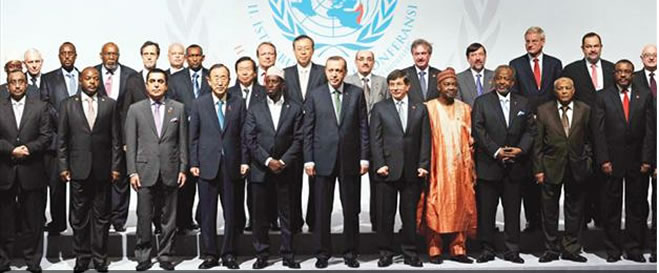Politicians from Somalia and the international community discussed the post-transition period inSomalia to end decades of unrest in the country.
The second Istanbul Conference onSomalia called for a global reconstruction effort to supportthe ongoing stabilization efforts and proposed a fund mechanism to train Somali police as part of efforts to maintain a secure environment in the conflict-hit country.
“In the face of terrorism, piracy and drought, Somalia needs solidarity. Partners have to step up and do their part,” U.N. Secretary-General Ban Ki-moon said yesterday.
The international community must help Somalia build its own security apparatus, establish rule of law and shed a pervasive culture of impunity, the U.N. secretary-general said, adding that international forces cannot solve Somalia’s security problems in the long term and the fragile country needs its own strong force to do the job. Somaliadoesn’t have a national army and needs military training, Somali President Sheikh Sharif Sheikh Ahmed said. “We need to have a realistic state structure. These things are not easy at all because we are facing major problems, and the terrorists continue with their activities. The clashes from tensions have hindered our efforts during the transition period,” he said.
Political agenda
The conference brought together the U.N., regional organizations and countries involved in the Somali issue, as well as the Transitional Federal Government, Somali civil society and traditional elders, whose aim is to prepare the ground for the post-transition period in Somalia, on political, defensive and economic levels.
After the first day of the conference, when senior officials, experts and businessmen discussed key issues such as water, energy, roads and sustainability, the second day of the conference turned its attention to the political dimension of aid to Somalia.
Representatives from all groups in Somalia, except al-Shabab members, were invited to the meeting, a Turkish official said.
The key issue in facilitating reconstruction of the country is to maintain a secure environment, the official said. “Therefore we proposed establishing a fund mechanism for Somalia to train their police and provide equipment,” he said.
A group of 300 to 350 Somalis, including traditional elders, representatives of the diaspora and civil society, gathered in Istanbul last week and discussed expectations for the future of Somalia, which they then expressed to conference participants yesterday.
Ending the mission of the African Union Mission in Somalia (AMISOM) in Somalia was among those common findings, the official said.
A timetable backed by the United Nations calls for a new constitution and parliament, to be followed by a vote for president and prime minister by Aug. 20. The current administration is battling against time to reclaim control of the territory before it dissolves. At the core of Turkey’s Somali policy is ensuring simultaneous and parallel conduct of political, economic, security, reconstruction, development, education and humanitarian actions, Turkish Foreign Minister Ahmet Davutoğlu said yesterday. He said coordination was important for success in the process.

